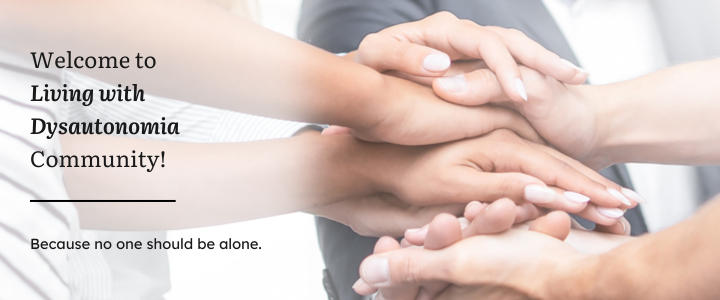
Join our Living with Dysautonomia Community
Living with Dysautonomia is a dedicated patient-to-patient support community for families affected by Dysautonomia. It is an online community that is powered by BensFriends.org, a network of patient support communities for rare diseases.
Our mission at Ben’s Friends is to ensure that patients living with rare diseases or chronic illnesses, as well as their caregivers, family, and friends, have a safe and supportive place to connect with others like them.
Living With Dysautonomia is run by volunteer moderators who have been affected with Dysautonomia disorder.
If your family has been affected by Dysautonomia, consider Living With Dysautonomia your second home. Living With Dysautonomia, as well as the rest of BensFriends.org’s patient communities, is free for members to join.
What is Dysautonomia?
Fast facts about Dysautonomia
- There are around 15 types of dysautonomia.
- Primary dysautonomia is usually inherited or due to a degenerative disease, while secondary dysautonomias result from another condition or injury.
- The most common types are neurocardiogenic syncope, which leads to fainting. It affects millions of people globally.
- There is no single treatment that addresses all dysautonomias.
Dysautonomia Types:
There are at least 15 different types of dysautonomia. The most common are neurocardiogenic syncope and postural orthostatic tachycardia syndrome (POTS).
Neurocardiogenic Syncope
Neurocardiogenic syncope (NCS), also known as Vasovagal Syncope, is one of the most common forms of dysautonomia. It affects tens of millions of people worldwide. The main symptom is fainting, also called syncope. This can occur on occasion only, or it may be frequent enough to disrupt a person’s daily life.
Gravity naturally pulls the blood downward, but a healthy ANS adjusts the heartbeat and muscle tightness to prevent blood pooling in the legs and feet, and to ensure blood flow to the brain.
NCS involves a failure in the mechanisms that control this. Temporary loss of blood circulation in the brain causes fainting.
Most treatments aim to reduce symptoms.
For people who faint only occasionally, avoiding certain triggers can help.
Triggers include:
- dehydration
- stress
- alcohol consumption
- very warm environments
- tight clothing
Medication such as beta-blockers and pacemakers may be used to treat persistent or severe cases of NCS.
Postural Orthostatic Tachycardia Syndrome
Postural orthostatic tachycardia syndrome (POTS) affects between 1 and 3 million people in the United States (U.S.). Around 80 percent of them are female. It often affects people with an autoimmune condition.
Symptoms can include:
- lightheadedness and fainting
- tachycardia, or abnormally fast heart rate
- chest pains
- shortness of breath
- stomach upset
- shaking
- becoming easily exhausted by exercise
- over-sensitivity to temperatures
POTS is normally a secondary dysautonomia. Researchers have found high levels of auto-immune markers in people with the condition, and patients with POTS are also more likely than the general population to have an autoimmune disorder, such as multiple sclerosis (MS), as well.
Apart from auto-immune factors, conditions that have been linked to POTS or POTS-like symptoms include:
- some genetic disorders or abnormalities
- diabetes
- Ehlers-Danlos Syndrome, a collagen protein disorder than can lead to joint hypermobility and “stretchy” veins
- infections such as Epstein-Barr virus, Lyme disease, extra-pulmonary mycoplasma pneumonia, and hepatitis C
- toxicity from alcoholism, chemotherapy, and heavy metal poisoning
- trauma, pregnancy, or surgery
- Research into the causes of POTS is ongoing. Some scientists believe it might be due to a genetic mutation, while others think it is an autoimmune disorder.
How is Ben’s Friends Different from Social Media and Other Support Sites?
Our mission at Ben’s Friends is to ensure that patients living with rare diseases or chronic illnesses, as well as their caregivers, family, and friends, have a safe and supportive place to connect with others like them.
We’re interested in you as a person, and in your struggles as a rare disease patient. But we don’t want to know your name or where you live. We won’t even allow you to use your real name when you register for one of our communities. Because when it comes to medical things, anonymity is important in our googly universe. Your information is never shared, and your activity never tracked by adware.
When Ben’s Friends asks for the country and region you live in, that’s in case your fellow members can recommend local resources and help, and so everyone knows what kind of medical system there is where you live. That’s important when it comes to giving and getting support. Because we are all about support, and we’re all in this together..
Ben’s Friends: Safe and Supportive.
And anonymous to keep it that way.
Why create an account for Living with Dysautonomia?
Posts on the different Ben’s Friends communities can be read by anyone on the internet. You can browse through the different topics and find most of the information you’re looking for but there are many things you won’t be able to do unless you create an account. These include:
Making your own posts. Although you’re able to find useful information just by reading other members’ posts, you might still have a lot of questions in your mind. Either you want to start a new topic to talk about them in detail or you want to reply to a comment on a thread. These won’t be possible unless you create a new user account.
Viewing other members’ profiles. Member profiles include information about the country or region they are from, whether they are a patient or a caregiver, and details about their disease and treatments. Maybe you came across an interesting post and you want to learn more about the member. Or maybe you’re looking for members who are from the same country as you. Having a user account allows you to see other member profiles and find information that may be relevant.
Sending private messages. Aside from being able to post publicly and commenting on a thread, having a user account also allows you to send private messages both to other members and moderators. In case you want to discuss a topic only with a specific person, this is possible by sending private messages when you have created your account.
Click here to create an account and join.
Latest Discussions
- What Helps YOU Most When Living with Dysautonomia?by BFAdmin on December 21, 2025
Living with dysautonomia means dealing with changes in blood pressure, dizziness, fatigue, heart rate fluctuations, brain fog, and so much more. Every person’s experience is different — and that’s exactly why we created this space: to learn from each other. Daily Management Tips You Can Share Whether you’re newly diagnosed or have been managing symptoms for years, small strategies can make a big difference. Let’s use this thread to share what works for you. Here are a few ideas to […]
- Today is Giving Tuesday. Here Are Two Easy Ways to Help Our Communityby ModSupport on December 2, 2025
Hi everyone, Today is Giving Tuesday, a day when many people look for meaningful causes to support. If you would like to help our community today, here are two simple and meaningful options. 1) Share our campaign with friends or family This is one of the most helpful things members can do. Even if you cannot donate, you can still make a big impact by spreading the word. Here are a few copy-and-paste messages you can use. Email or Facebook: I am part of a rare-disease support community that has […]
- Our Community Is Coming Together. Here Is How You Can Helpby ModSupport on November 25, 2025
Hi everyone, As we approach the end of the year, our entire Ben’s Friends network is launching our annual community support campaign. Each forum plays an important role, so we wanted to share a few simple ways you can help strengthen this space we all rely on. Most importantly, there is never any expectation to give financially. Just being here, supporting one another, and sharing your experiences already makes this community special. If you do want to be involved, here are a few meaningful […]
- Complementary Therapies That May Help Manage Dysautonomiaby BFAdmin on October 23, 2025
Living with dysautonomia can bring challenges like dizziness, fatigue, and heart rate fluctuations that affect daily life. While medical care remains the cornerstone of treatment, many patients also explore complementary therapies to help manage symptoms and improve overall well-being. Mind-Body Practices Stress can worsen autonomic symptoms, so calming the nervous system is key. Practices like deep breathing, meditation, yoga, and tai chi can help improve circulation and support autonomic […]
- Mara Wilson’s Story: A Familiar Face, A Real Diagnosisby BFAdmin on October 23, 2025
Actor-writer Mara Wilson, best known for her roles in Matilda and Mrs. Doubtfire, has openly shared that she lives with the dysautonomia condition known as Postural Orthostatic Tachycardia Syndrome (POTS). Despite her childhood fame, Mara found herself facing symptoms that many with dysautonomia know well: dizziness, rapid heartbeat when standing, fatigue, and the frustration of seeking diagnosis. She shared on social media that a tilt-table test confirmed what she and her doctors suspected. […]






